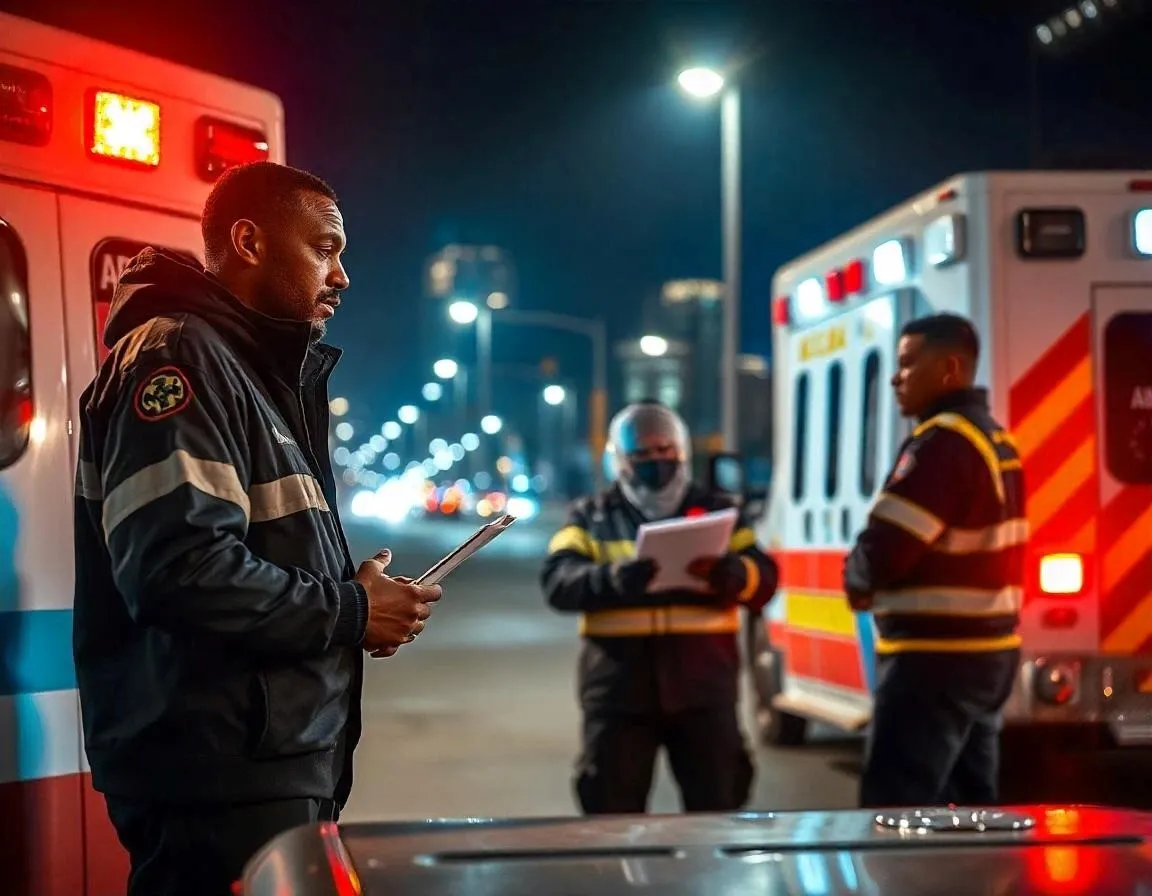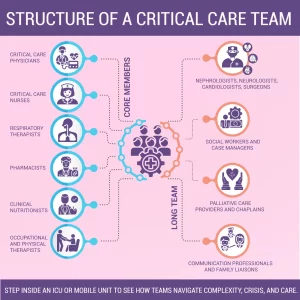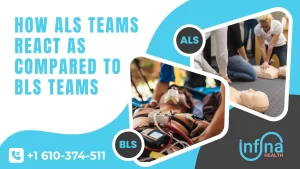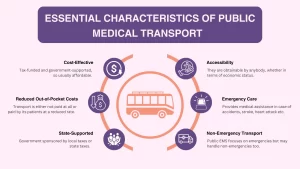How to Deal with Medical Transportation Delays in Emergency Situations
Medical emergencies require rapid and efficient response, but even the most planned rescue operations can face significant hurdles. One of the most challenging obstacles in the face of an emergency situation is medical transport delays. Whether you’re dealing with a roadblock, bad weather, or a vehicle malfunction, these delays can drastically impact the care and treatment a patient receives.
This detailed guide explores the causes of medial transportation delays in emergencies, how to handle them when they occur, and how to prepare in advance to minimize their impact.

Medical personnel responding to an emergency situation, standing beside ambulances to provide immediate care.
Causes of Medical Transportation Delays in Emergencies
In an ideal world, emergency medical transportation services like ambulances and air medical services would always be able to reach patients quickly. However, reality is much more unpredictable. Below, we explore some of the common causes of delays:
1. Traffic and Road Conditions
One of the most frequent causes of transportation delays in urban and suburban environments is traffic. Traffic congestion, accidents, road closures, or ongoing construction can slow emergency vehicles down. What might be a routine drive for an ambulance under normal conditions can be drastically delayed when the route is blocked or gridlocked.
2. Weather Conditions
Severe weather events like snowstorms, fog, or torrential rains can drastically hinder transportation options. While emergency vehicles are generally equipped to handle less-than-ideal conditions, extreme weather can still delay response times.
In rural or mountainous areas, bad weather can impact air transport as well. Helicopter medical services are often grounded in poor weather conditions, which forces hospitals to rely on other means, such as ground transport, which may take longer.
3. Vehicle or Equipment Malfunctions
Mechanical failures or breakdowns are a significant risk for all types of medical transport vehicles, including ambulances, air ambulances, and other emergency transport vehicles. A flat tire, engine failure, or malfunctioning medical equipment can leave an emergency crew stranded and delay the transport of a patient.
These malfunctions can be particularly problematic if the medical team is in a remote area with limited access to backup vehicles or repair services. However, most emergency services have protocols for this, including secondary vehicles and spare equipment.
4. Resource Availability
In major cities, multiple emergencies may occur simultaneously, leading to a shortage of available ambulances or air medical services. If an emergency medical transport service is already handling other patients, they may not be able to respond immediately. Similarly, hospitals and medical facilities may be overwhelmed, leaving fewer resources available for quick patient transport.
5. Distance and Geographic Location
In rural or remote areas, access to medical transportation services can be limited. When a medical emergency occurs in a location far from medical facilities or highways, it may take longer for emergency vehicles to reach the site. Even if there is no significant delay on the roads themselves, the sheer distance between the patient and the nearest medical center can make the transport time longer.

Female medical professional assisting a pregnant woman during medical transportation, ensuring her comfort and safety.
An ambulance ready to depart from a fleet of emergency medical vehicles, preparing to respond to an urgent medical situation.
Don’t wait until it’s too late. Read our blog on “How to Support Patients with Mental Health Conditions During Medical Transportation” to ensure you’re prepared for any emergency situation.
Immediate Actions to Take During Medical Transportation Delays
When transportation delays occur, the priority is always patient safety. Here are immediate actions to take to manage the situation:
1. Communicate with Medical Providers
If you’re in communication with the medical facility or paramedics, it’s essential to keep them updated about any transportation delays. Hospitals may be able to adjust their plans to accommodate the delay, whether by preparing additional medical staff or by changing the patient’s treatment plan. Communication ensures everyone involved in the patient’s care remains informed and prepared for eventual arrival.
If you’re a caregiver or family member, stay in contact with the emergency services team. Be clear about the patient’s condition so they can provide you with guidance on any steps you should take while waiting.
2. Monitor the Patient’s Condition
During medical transport delays, it’s crucial to monitor the patient’s condition closely. Keep track of vital signs like heart rate, blood pressure, and breathing. If you’re not trained to assess these signs, focus on keeping the patient as comfortable and calm as possible. Ensure that they are properly positioned, particularly if they have injuries, and prevent them from becoming cold or overheated.
3. Alert Emergency Contacts
In addition to notifying medical teams, make sure to inform the patient’s emergency contacts or loved ones about the delay. Keeping them informed helps reduce anxiety and enables them to make necessary preparations once the patient arrives at the hospital. It also ensures that family members are on standby in case the patient’s condition worsens.
4. Utilize Alternate Transport Options
If the delay is prolonged and the patient’s condition is deteriorating, consider alternative transport methods. For example, if an ambulance is delayed, and air transport is available, it may be worth considering an airlift. Helicopter services or air ambulances can bypass road traffic, especially in densely populated areas or when accessing remote locations.
If necessary, explore backup options like private transport or non-medical vehicles, but only if the patient’s condition allows for it.
5. Ensure Safety Protocols Are Followed
Safety is always the top priority during a medical emergency, even when there’s a delay. If you’re a first responder or a caregiver, make sure that emergency equipment, such as oxygen tanks, defibrillators, or medications, remains accessible and functional. Never compromise on safety protocols, even if delays are frustrating or prolonged.
Need emergency medical transport? Schedule with Infina Health for immediate, reliable service, ensuring no delays in critical moments.
How to Plan Ahead to Minimize the Impact of Delays?
While it’s impossible to eliminate transportation delays entirely, advance planning can help reduce their impact. Here’s how:
1. Know Local Transportation Resources
Familiarize yourself with the local transportation resources available to you in the event of an emergency. This includes knowing which ambulance services are available, what their response times are like, and which hospitals or medical centers offer specialized care for certain conditions. In rural areas, knowing where air medical services are located can be essential.
Consider pre-arranging emergency transportation services with your healthcare provider if you have ongoing medical needs or live in an area prone to emergencies.
2. Use Technology to Your Advantage
Technology has made it easier than ever to stay informed during medical emergencies. GPS tracking apps allow emergency vehicles to find the fastest route, avoiding roadblocks and traffic. Many ambulances and air medical services also use real-time traffic monitoring systems to ensure the quickest possible route.
Additionally, telemedicine apps allow patients and caregivers to consult remotely with healthcare professionals during transport delays. These services can help guide you through managing the patient’s care until transportation resumes.
3. Pre-arrange Emergency Medical Transport Services
When possible, pre-arrange transport services for specific types of emergencies. For example, patients who are regularly hospitalized or those who have chronic conditions may benefit from pre-arranged ambulance services that can respond faster in the event of a medical emergency.
Hospitals or healthcare providers may be able to assist in setting up these services, or they might offer emergency transport options directly.
4. Pre-Plan for Remote Areas
For those who live in remote areas or who may be traveling to less accessible locations, pre-planning is even more crucial. Always be aware of the nearest available emergency services and have contingency plans in place. This might include understanding which roads or routes are most likely to be affected by weather, knowing the closest airstrips for helicopter transport, or having a satellite phone for communication in case of a delay.
Conclusion
Dealing with medical transportation delays in emergencies requires quick thinking, effective communication, and solid planning. While delays are often unavoidable, being prepared for them can make a significant difference in outcomes. By knowing the causes of delays, taking immediate actions when they occur, and planning ahead to reduce their impact, you can help ensure that the patient receives the best possible care, even in the face of unpredictable circumstances.
At Infina Health, we understand the critical nature of timely medical transportation. Our services are known for their promptness and reliability, ensuring that patients are transported quickly and safely to the care they need. If you’re facing a medical emergency, don’t let transportation be an obstacle and contact Infina Health for immediate assistance.






